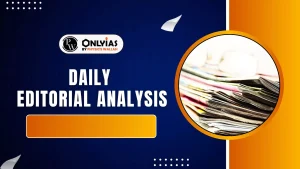A report submitted by the Finance Minister in the Rajya Sabha states that 5,892 cases were taken up by the Enforcement Directorate (ED) under the Prevention of Money Laundering Act (PMLA) 2002, since 2015.
- Of these cases, only 15 convictions have yet been ordered by special courts.
- The government claims that investigations have been initiated in more or less all cases, and that Enforcement Case Information Reports (ECIRs) have been issued to initiate proceedings.
Concerns Raised After Report Submission
- First, that the number of convictions vis-a-vis total cases is far from satisfactory and
- Secondly, money laundering cases have been rising, signalling that the government has not been able to check such financial crimes.
About Money Laundering
- In line with the UN Political Declaration and Global Programme of Action (adopted by the UN General Assembly in February 1990),the Prevention of Money Laundering Act (PMLA) of 2002 has been made to prevent money laundering and to confiscate the property involved or obtained.
- Money laundering, as defined under Section 3 of Prevention of Money Laundering Act (PMLA), is an act through which processes or activities connected to the proceeds of crime are concealed, possessed, acquired, or used and projected as untainted property or claiming to be untainted property.
Mechanics of Money Laundering
Money laundering typically involves three distinct stages:
- Placement: Illegally acquired cash is introduced into the financial system, often by breaking large sums into smaller amounts (known as ‘smurfing’) and depositing them into various accounts.
- Layering: The funds are then moved through complex chains of transactions, involving multiple accounts, foreign transfers, shell companies, and even cryptocurrencies, to obscure their illegal origin.
- This makes tracing the money’s true source exceptionally difficult.
- Integration: The ‘cleaned’ money is finally reintroduced into the legitimate economy through investments in real estate, luxury assets, or businesses, appearing as untainted property.
- These assets are often purchased in the names of shell companies or proxies to further conceal the true beneficiary.
Impact of Money Laundering
- Economic Impact: Money laundering expands the money supply, causing economic instability and inflation.
- It also inflates property prices, making real estate less affordable.
- Threat to National Security: Laundered money often funds terrorism and organized crime, posing a serious threat to national security and the country’s sovereignty.
- Financial Stability: Money laundering undermines India’s financial system and distorts normal market functioning.
Challenges in Combating Money Laundering
Despite the stringent legislation like the Prevention of Money Laundering Act (PMLA) of 2002, several challenges undermine India’s efforts:
- Low Conviction Rates: Since 2015, the Enforcement Directorate (ED) has registered 5,892 cases under PMLA, yet only 15 convictions have been secured.
- This alarming disparity highlights a significant gap in the effective implementation of the law.
- Misuse of the Law: The PMLA’s provisions, particularly concerning the confiscation of property without a pre-registered scheduled offence, have been misused, often with politically motivated intentions. This undermines public trust and diverts focus from genuine financial crimes.
- Complex Transactions: Money laundering operations have become increasingly sophisticated, leveraging digital methods, cryptocurrencies, and Bitcoin, making them difficult to track and investigate.
- Difficulty in Linking to Terrorism: Authorities often struggle to establish a direct link between laundered funds and terror financing activities, hindering comprehensive counter-terrorism efforts.
Cases Related to Money Laundering
- P. Chidambaram versus Enforcement Directorate (2019): The Supreme Court (SC) held that hiding the illegal source of money affects the financial system and also the sovereignty and integrity of the nation.
- Vir Bhadra Singh versus ED (2017): The SC that no FIR is required to initiate proceedings under the Act. The only requirement was that a scheduled offence (offence against the state) be essential for the offence of money laundering.
- Vijay Madanlal Chaudhury versus Union of India (2022): The Court held that to initiate prosecution under Section 3 of the PMLA, registration as scheduled offence is a pre requisite but for initiating attachment of property under Section 5, there need not be a pre-registered criminal case.
Strategies for Effective Counter-Money Laundering
- Strict Adherence to Financial Action Task Force (FATF) Guidelines: India must rigorously implement all 40 recommendations provided by the Financial Action Task Force (FATF).
- These international guidelines are crucial for strengthening anti-money laundering (AML) frameworks and enhancing the rate of conviction.
- Double Taxation Avoidance Agreements (DTAA): India has DTAAs with approximately 85 countries.
- These agreements facilitate the exchange of financial and tax-related information, which is vital for detecting money laundering, particularly during the ‘layering’ stage of suspicious transactions.
- Proactive use of these agreements is non-negotiable.
- Leveraging Advanced Technology: India must invest heavily in Artificial Intelligence (AI) and blockchain technology to track and analyse suspicious transactions, enhancing the efficiency and effectiveness of investigations.
- Establishment of Fast-Track Courts: To address the abysmal conviction rate, the establishment of dedicated fast-track courts for PMLA cases is imperative.
- This will ensure swifter trials and resolutions, acting as a stronger deterrent against financial crimes.
- Preventing Misuse and Ensuring Genuine Application: The PMLA must be applied strictly to address genuine financial crimes, not for political vendettas.
- Clear guidelines and oversight mechanisms are required to prevent the abuse of power, ensuring that property confiscation only occurs when substantial evidence of a scheduled offence exists.
- Enhanced International Cooperation: India must strengthen its collaboration with international bodies like the FATF and the United Nations, as well as with individual countries, to share intelligence, best practices, and facilitate cross-border investigations.
- Dedicated Focus on Terror Financing Linkages: Law enforcement agencies must intensify their efforts to trace and disrupt financial flows linked to terrorism.
- Robust intelligence gathering and inter-agency coordination are critical to dismantle terror financing networks that rely on laundered funds.
Conclusion
By implementing these strategies decisively, India can significantly bolster its defences against money laundering, safeguard its economy, and uphold the integrity of its national security framework.
![]() 9 Aug 2025
9 Aug 2025
